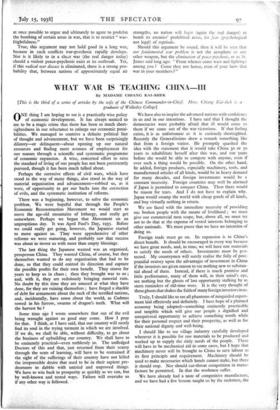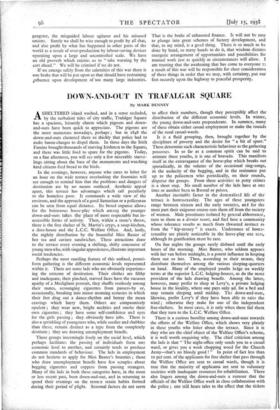WHAT WAR IS TEACHING CHINA
By MADAME CHIANG KAI-SHEK
[This is the third of a series of articles by the wife of the Chinese Commander-in-Chief.
graduate of Wellesley College] • Mme. Chiang Kai-shek is a ONE thing I am hoping to see is a practically wise policy ofeconomic development. It has always seemed to me to be a tragic crime that there has been so much short- sightedness in our reluctance to enlarge our economic possi- bilities. We managed to contrive a definite political line of thought and advancement, but we have been surprisingly dilatory—or delinquent—about opening up our natural tesources and finding more avenues of employment for our masses through a scientific and systematic programme of economic expansion. A wise, concerted effort to raise the standard of living of our people has not been persistently pursued, though it has been much talked about.
Perhaps the corrosive effects of civil wars, which have stood in the way of many things, also stood in the way of material organisation and advancement—robbed us, as it were, of opportunity to get our backs into the correction of evils, and the systematic institution of reforms.
There was a beginning, however, to solve the economic problem. We were hopeful that through the People's Economic Reconstruction Movement we would start to move the age-old mountains of lethargy, and really get somewhere. Perhaps we began that Movement on an unpropitious day. It was April Fool's Day, 1935. Before we could really get going, however, the Japanese started to move against us. They were apprehensive of other reforms we were maturing, and probably saw that success was about to invest us with more than empty blessings.
The last thing the Japanese wanted was an organised, prosperous China. They wanted China, of course, but they themselves wanted to do any organisation that had to be done, so that they could control its direction and capture the possible profits for their own benefit. They strove for years to keep us in chaos ; then they brought war to us ; and, with it, they are sedulously bringing material ruin. No doubt by this time they are amazed at what they have done, for they are ruining themselves ; have forged a shackle of debt for armaments about the neck of the terrified nations, and, incidentally, have sown about the world, as Cadmus sowed in his furrow, swarms of dragon's teeth. What will the harvest be ?
Some time ago I wrote somewhere that out of the evil being wrought against us good may come. How I pray for that. I think, as I have said, that our country will surely find its soul in the trying torment in which we are involved. If we do, we shall be able, without difficulty, 'to go about the business of upbuilding our country. We shall have to be eminently practical—even ruthlessly so. The unfledged Doctors of this and that, just returned from their scurry through the seats of learning, will have to be restrained if the sight of the sufferings of their country have not "killed the irrepressible desire that used to be in their sapient pre- decessors to dabble with untried and unproved things. We have to win back- to prosperity as quickly as we can, but by well-known and tested ways. Failure will overtake us if any other way is followed. We have also to inspire the advanced nations with confidence. in us and in our intentions. I have said that I thought the democracies were probably afraid that ill would come to them if we came out of the war victorious. If that feeling exists, it is as unfortunate as it is curiously shortsighted. Recently the Generalissimo drew a remark something like that from a foreign visitor. He promptly quashed the idea with the statement that it would take China 3o or 5o years to rehabilitate herself after this war, and too years before she would be able to compete with anyone, even if ever such a thing would be possible. On the other hand, he added, foreign products, especially machinery, tools, and manufactured articles of all kinds, would be in heavy demand for many decades, and foreign investments would be a constant necessity. Foreign countries may well be alarmed if Japan is permitted to conquer China. Then there would be reason for tears. And I do not have to explain why. Japan would swamp the world with cheap goods of all kinds, and buy virtually nothing in return.
We are faced with the immediate necessity of providing our broken people with the means of livelihood ; we must give our commercial men scope, but, above all, we must try not to do that at the expense of vested interests belonging to other nationals. We must prove that we have no intention of doing so.
Foreign trade must go on. Its expansion is to China's direct benefit. It should be encouraged in every way because we have great needs, and, in time, we will have raw materials to satisfy the needs of others. Investments must be pro- tected. My countrymen will surely realise the folly of post- prandial oratory upon the advantages of investment in China if the investors are given reason to see nothing new or substan- tial ahead of them. Instead, if there is much promise and little performance, many of them will, in their mind's eye, see nothing but the ghosts of lost opportunity stalking by as stern reminders of old-time woes. It is the very thought of those ghosts that shakes the faith of many foreign investors in us.
Truly, I should like to see all phantoms of misguided experi- ment laid effectively and definitely. I have hope of a planned economy being adopted—something eminently practicable and tangible which will give our people a dignified and unequivocal opportunity to achieve something worth while for their personal respect and their prosperity, as well as for their national dignity and well-being.
I should like to see village industry carefully developed wherever it is possible for raw materials to be produced and worked up to supply the daily needs of the people. There will have to be mechanical aid in some cases, but I hope that machinery never will be brought to China to save labour as its first principle and requirement. Machinery should be used to make necessaries which hands cannot make, but there it should stop. Nor should cut-throat competition in manu- facture be permitted. In that the workmen suffer.
We have already had a taste of competitive manufacture, and we have had a few lessons taught us by the racketeer, the gangster, the misguided labour agitator and his misused unions. Surely we shall be wise enough to profit by all that, and also profit by what has happened in other parts of the world as a result of over-production by labour-saving devices operating upon a large and uncontrolled scale. We have an old proverb which enjoins us to " take warning by the cart ahead." We will be criminal if we do not.
If we emerge safely from the calamities of this war there is one brake that will be put upon us that should have restraining influence upon development of too many large industries. That is the brake of exhausted finance. It will not be easy to plunge into great schemes of factory development, and that, to my mind, is a goad thing. There is so much to be done by hand, so many hands to do it, that wisdom dictates energetic arrangement of opportunities and possibilities for manual work just as quickly as circumstances will allow. I am trusting that the awakening that has come to everyone es a result of this war will be responsible for close consideration of these things in order that we may, with certainty, put our feet securely upon the highway to peaceful prosperity.











































 Previous page
Previous page